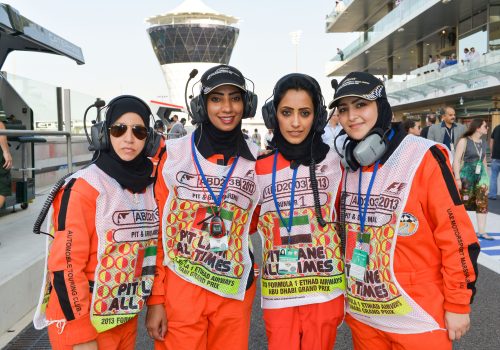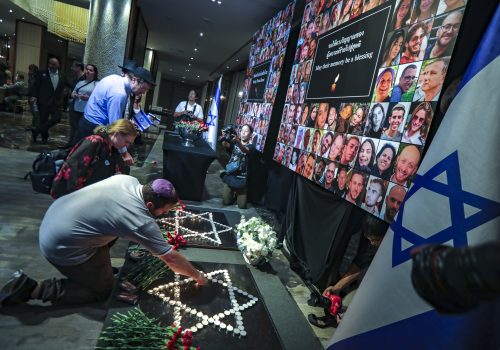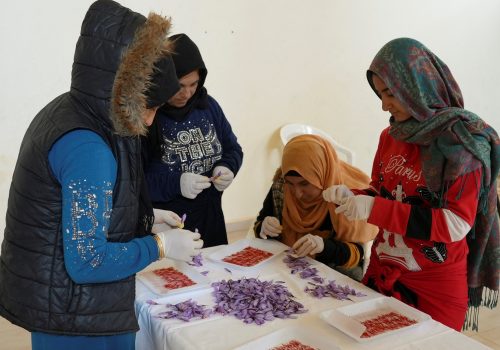While wars rage on, women wage peace in the Middle East
International Women’s Day is an annual event on March 8 that recognizes and honors the achievements of women worldwide. It is an occasion to reflect on progress made, acknowledge the challenges that persist, and inspire collective action to create a more equitable world. It is also a call to address systemic barriers, empower women, and foster a world where women’s voices are heard and their rights are fully realized.
This year, as part of International Women’s Day, three women from the Middle East, working toward a more equal world, have been recognized in Time magazine’s annual list of the most influential women. They include Nadia Murad, a Yazidi human rights activist, as well as two women who have formed a historic Israeli-Palestinian partnership: Yael Admi, a co-founder and leader of the Israeli movement Women Wage Peace; and Reem Hajajreh, founder and director of the Palestinian organization Women of the Sun. The one thing they have in common is that, despite their circumstances, they continue to push forward for equal rights.
Nadia Murad is a leading advocate for survivors of genocide and sexual violence. She was captured by the Islamic State of Iraq and al-Sham (ISIS) militants in 2014 and has been outspoken about the horrific abuse she suffered at their hands. In her 2017 memoir, The Last Girl: My Story of Captivity, and My Fight Against the Islamic State, Murad recounts her brutal experience and the heroic reclaiming of her life. She earned a Nobel Peace Prize in 2018 alongside Congolese physician Dr. Denis Mukwege for their efforts to end the use of sexual violence as a weapon of war. Murad is also the founder of Nadia’s Initiative, an organization dedicated to “helping women and children victimized by genocides, mass atrocities, and human trafficking to heal and rebuild their lives and communities.”
Despite heroes like Murad and Dr. Mukwege, and other international efforts to address these issues, the prevalence of violence against women in conflict remains a harsh reality. Women often bear the brunt of violence during times of conflict, becoming victims of war. That includes sexual violence, displacement, and targeted attacks. Their bodies become weaponized, and the expressions of their tormentors’ rage and dehumanization. The impact of war on women extends beyond direct physical harm, as displacement and breakdown of social structures further expose them to vulnerabilities. Disproportionate suffering is evident in the staggering number of female refugees and internally displaced persons, who often face increased risks of gender-based violence.
This tragic cycle repeated itself on October 7, 2023 with the “systematic, targeted sexual abuse of Israeli women during the Hamas-led assault on southern Israel” aimed at terrorizing and humiliating victims and their families. There is a growing body of evidence of acts of sexual torture—including rape and gang rape, as well as mutilations and gunshots to genital areas—the facts of which have been documented in the recent report of the Association of Rape Crisis Centers in Israel, which was submitted to decision-makers at the United Nations (UN).
SIGN UP FOR THE THIS WEEK IN THE MIDEAST NEWSLETTER
Subsequently, there has been a disproportionate impact of war on Palestinian women in Gaza. According to the World Health Organization, women and newborns are bearing the brunt of the conflict, representing 67 percent of all casualties. UN Women has also pointed to gender inequality and the burden on women fleeing the fighting with their children, accounting for 63 percent of all deaths in Gaza. Recently, the UN has also noted credible allegations of both human rights violations and sexual violence against Palestinian women and girls in the Gaza Strip and the West Bank.
With cruel and almost prescient timing, just three days before the October 7, 2023 Hamas attack, some 1,500 Israeli and Palestinian representatives of Women Wage Peace and Women of the Sun descended on Jerusalem and the shores of the Dead Sea, calling for their governments to find a diplomatic solution to the ongoing situation, elevate the role of peacemaking, and stop further violence. The two distinct, yet fully aligned grassroots peace organizations gathered to demand an end to the “cycle of bloodshed” consuming their communities and for their respective leaders to return to the negotiating table to secure a nonviolent resolution to their decades-long conflict.
It was a jubilant affair, but the joy was short-lived. Just three days later, Hamas militants unleashed their massacre, killing some 1,200 people in Israel, including three members of Women Wage Peace, one of whom was co-founder and Canadian-born Vivian Silver. Since then, at least twenty-seven Women of the Sun members in Gaza have been killed.
Despite this horrific backdrop, both organizations continue to forge ahead. They are focused on their respective communities, and they are also dedicated to continuing working together. One of their primary achievements has been the Mothers’ Call, a joint declaration by Palestinian and Israeli women united for a peaceful resolution and a future of peace, freedom, equality, rights, and security for their children and future generations.
As the Israel-Hamas war rages on, their cause is gaining momentum. The two organizations have been jointly nominated for the 2024 Nobel Peace Prize, acknowledging not only that women are unjustly impacted by war, but that they are also part of the solution. According to data published by the Georgetown Institute for Women, Peace and Security, the more women are engaged in peacemaking, peacekeeping, and peacebuilding, the more peace there is in the world. Negotiations go better, peace is more enduring, and more members of society reap the benefits.
Women make up 50 percent of the global population, though they are seriously under-represented in areas that have the greatest impact on all members of society. Data show that the more women are included in the economy, education, politics, and the legal system, the more prosperous, peaceful, just, and safe the world will be for children and future generations.
On International Women’s Day this year, the world needs more voices echoing the resounding calls for peace and justice in the face of ongoing conflicts. The international community must acknowledge and support those women who are fighting every day to make a difference. The recognition of Nadia Murad and the collaborative efforts of Yael Admi and Reem Hajajreh underscore the indispensable role women play in shaping a more harmonious world. Their resilience has been tested, but their unwavering commitment persists. As these women stand at the forefront of change, they serve as powerful reminders that women are more than victims of war; they are crucial architects of lasting, peaceful solutions.
Marcy Grossman is a nonresident senior fellow with the Atlantic Council’s Rafik Hariri Center and Middle East Programs and former Canadian ambassador to the United Arab Emirates.
Further reading
Tue, Feb 7, 2023
The UAE and Israel have a history of strong female leadership. Women must take substantial roles in the next phase of the Abraham Accords.
MENASource By Marcy Grossman
To have a sustained and enduring peace in the region after the signing of the Abraham Accords, women must also be equally included and reflected in policy-making, decision-making, and programming.
Wed, Oct 25, 2023
The kidnapping of a peace activist by Hamas reveals the cruel irony of the situation Israel faces
MENASource By Carmiel Arbit
The hostage crisis Israel is facing is unprecedented. Yet, there is some familiarity with the territory.
Fri, Sep 29, 2023
Cultivating change: Women as catalysts for agricultural transformation in the MENA region
MENASource By Marcy Grossman
By engaging women in decision-making leadership roles and providing them with access to education and training, a wellspring of innovative solutions can be unlocked to address challenges in agriculture, food security, and water security.
Image: Palestinian and Israeli women march, as part of an event organised by "Women Wage Peace" group calling for an end to the Israeli-Palestinian conflict, near the Jordan River, in the occupied West Bank October 8, 2017. REUTERS/Ronen Zvulun


